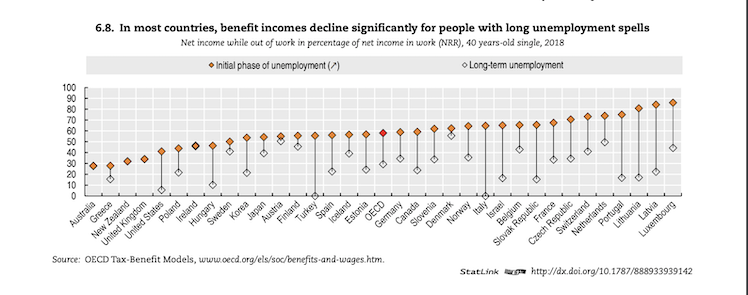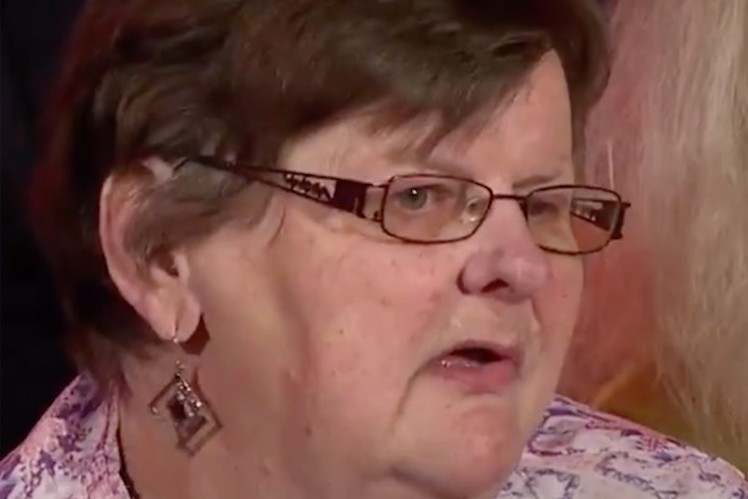Another global agency has exposed Australia as bringing up the rear in caring for the disadvantaged. Alan Austin reports from Europe.
Stone cold, motherless last is where the Organisation for Economic Cooperation and Development (OECD) now ranks Australia on generosity towards people out of work.
The OECD is the club of 36 developed mixed capitalist economies. It regularly reports on a wide range of social and economic outcomes and provides useful benchmarks by comparing all 36 countries.
Over the last six years, the OECD has reported that Australia’s ranking on many desirable economic outcomes has been steadily tumbling. On several variables which measure care for the needy, Australia is now ranking last or close to.
Every two or three years, the OECD issues a fairly detailed but highly readable analysis of progress, or regress, the major developed countries are making on the critical social issues of the day. Titled Society at a Glance, the 2019 edition focuses on advances in accepting same-sex relationships, health outcomes and care for those doing it tough.
Recent research has measured the extent to which a typical working person’s income falls when he (a single male, aged 40, no kids) moves from full-time paid work to unemployment, whether due to illness, retrenchment or any other reason. The results are not good for Australia.
An intriguing graphic shows the level to which this typical worker’s income falls, with the percentage on the left vertical axis.

Workers in Portugal, Lithuania, Latvia and Luxembourg are now supported during jobless stints on more than 75% of their previous wage. Okay, these are small, flexible economies, although only the last is considered rich.
A majority of 22 of the 34 OECD economies studied here support their jobless with between 50-75% of the previous wage. These include the large economies Japan, France, Germany, Spain and Italy, 14 smaller European economies, plus South Korea, Canada and Israel.
Just six economies expect workers to survive on between 30-50% of the previous wage. This leaves two trailing economies below 29% — Greece and Australia.
It should not be like this. The whole world has enjoyed extraordinary growth in income, jobs and wealth over the last six years. Government revenues have soared commensurately. This boom has enabled most advanced, civilised countries to ensure that those who cannot find work do not have to suffer poverty and humiliation. This, after all, is what “advanced” and “civilised” mean.
This is not entirely the fault of Australia’s Coalition. The graph, above, first appeared in the 2014 edition of Society at a Glance. Australia then ranked 30th out of 33 listed countries. That is, fourth last. Not brilliant.
Further, Labor and the other parties have generally failed to make this and related Coalition policy disasters significant election issues. One would think a concerted campaign showing Australia is now last among all developed countries in care for the destitute would gain some traction. Especially if it was part of a wider campaign showing Australia has shifted from near the top of the OECD to last or near last place today on many other variables. These include retail trade growth, wages, increase in gross debt and the value of the Aussie dollar.
Propaganda Prescription: how Australia can get its economic mojo back
Other findings of Society at a Glance include:
- On equality of income, Australia ranks 23rd out of the 27 countries compared. At one end of the scale, the Slovak Republic, Slovenia, Belgium, Finland and Austria all have less than 22% of the total income going to the top 10% of income earners. At the other end, Australia, New Zealand, United Kingdom, United States and Chile all allow the top end to grasp more than 26%.
- On workforce underutilisation, Australia ranks 24th out of 32 countries compared. That is, Australia is in the bottom third of the table on the proportion of the workforce either needing to work more hours or having no job at all. At the low end, Iceland has only 12.4% of its workforce underutilised. Australia’s 28.1% more than doubles that.
There is really no excuse for this. Australia’s export trade is booming with many commodities at historically high prices and volumes at or near all-time records. The trade surplus is now a thumping $8.04 billion! That’s almost four times the highest level reached under any previous government. Ever.
Treasury should have more than enough tax revenue to make Australia first in the OECD on care for the jobless rather than last.
The advantages of welfare generosity are threefold. First, it alleviates personal suffering, which is what Prime Minister Scott Morrison assured us in his maiden speech was the right thing to do.
Secondly, it avoids the costly social evils associated with deepening poverty. These include stress-related mental and physical illness, crime, drug abuse and suicide.
Thirdly, maintaining spending power across the community boosts retail turnover which has flow-on effects for wholesalers, importers, manufacturers, primary producers, transport and service providers. And then beyond.
The wrong people, it seems, are out of work in Australia, as we saw with Ricci Bartels recently on QandA.
“I have paid taxes for 46 years … I have put 20 years in the private sector and 26 years in the public sector for a not-for-profit community service. I was forced onto Newstart at the age of 62, through change of management and subsequent retrenchment…. I could not find a job, no matter how hard I tried. So my question to you, wonderful panellists, is this: what would you or how would you suggest people like me ‘have a go to get a go’?”
———————-
Australia falls to all-time OECD low on jobs but $A rallies against Zambian kwacha
Public support is vital so this website can continue to fund investigations and publish stories which speak truth to power. Please subscribe for the free newsletter, share stories on social media and, if you can afford it, tip in $5 a month.
Alan Austin is a freelance journalist with interests in news media, religious affairs and economic and social issues.

